John Boehner: The 'country-club' Republican now within two heartbeats of the President

Assuming he is elected the next Speaker of the House of Representatives next January, John Boehner will, according to the Constitution, be two heartbeats from the Presidency. Far more important, until his party chooses its presidential nominee for 2012, he will be the most powerful Republican in America.
The impact of the Tea Party movement may have been the biggest talking point of these mid-term elections. But after the largest Republican House landslide since 1946, it will be up to Mr Boehner to marshal his potentially unruly forces – and, more than any single individual, to decide how far, if at all, to work with Barack Obama and the Democrats in the two years of divided government that lie ahead. The answer is anyone's guess. The next Speaker is remarkably hard to categorize.
He is a "country-club" Republican – an avid golfer, whose home in his south-western Ohio district abuts the tenth green of the local golf course. But despite a fondness for sharp suits and a famous year-round suntan, he is not a country-club Republican in the image – say – of George H W Bush.
The Boehner background is humble. He grew up in a working-class Catholic family in Reading, close to Cincinnati. His parents were both Democrats and his father ran a small café. Their son was the first member of the family to attend college. As salesman for, and later boss of, a small plastics company, he turned into a Republican, but of the small-town Midwestern variety, a conservative with a small "c". His origins could not be more different than Nancy Pelosi, the Democrat from whom he will take over the House gavel.
She was the scion of a political dynasty, the daughter of a former Congressman and long-time Mayor of Baltimore, imperious and an unabashed liberal, identified with the central San Francisco district she has represented since 1987. Those qualities made her the lightning rod for the surge of anti-government sentiment that destroyed House Democrats on Tuesday.
Mr Boehner's ascent was rapid. In 1984 he was elected to the Ohio state legislature, and in 1990 won the local seat for Congress in Washington after the incumbent Republican was embroiled in a sex scandal. His impact was immediate. As one of an upstart "Gang of Seven" of new Republican Congressmen, he harassed the long-entrenched, over-complacent Democratic leadership, contributing to the Republican triumph of 1994.
His reward was the chairmanship of the House Republican Conference, the fourth ranking post in the party hierarchy under then Speaker Newt Gingrich. This was the period when Mr Boehner developed the ties with business lobbyists that have long provided fodder for his critics.
But the going was not always easy for the sleek Capitol Hill operator with a taste for the good life. In 1998 he was voted by his colleagues out of the conference chair job, as part of the upheaval following Gingrich's resignation from the Speakership. Mr Boehner might have simply left Congress at that point. Instead he threw himself into committee work, notably in the field of education where he worked with Ted Kennedy and other Democrats.
Whether this record portends readiness to co-operate now with the opposition is questionable. Democrats regard Mr Boehner as irredeemably partisan. But though combative, he is less ideological than Gingrich then, and the Tea Party now. He even briefly indicated a readiness to compromise on extending the tax cuts enacted under President George W Bush, the fate of which will be decided over the next few weeks by the outgoing "lame-duck" Congress.
Join our commenting forum
Join thought-provoking conversations, follow other Independent readers and see their replies
Comments
Bookmark popover
Removed from bookmarks